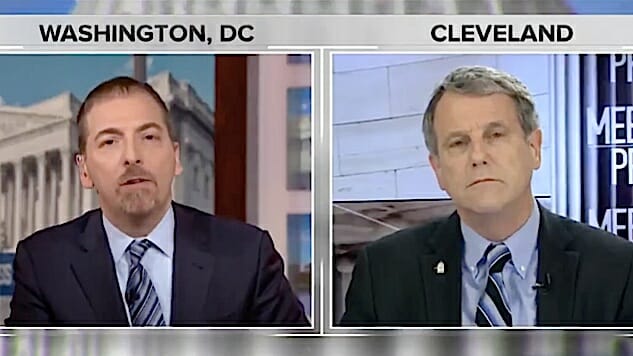Why Do Some Pundits Still Hesitate to Acknowledge Trump’s Racism?
Screencap via Twitter
At this point, the racism inherent to Donald Trump’s administration, and to Trump himself, should be self-evident. From the various dog whistles (or just loud, overt whistles) used in his campaign, to his reaction after Charlottesville, to his eager willingness to demonize immigrants, to the long family history of racist housing policy, to, well…his whole life, this is not a contentious topic among anyone on the liberal or progressive left. There’s even a Wikipedia page on it. The fact of Trump’s racism should be a fait accompli, not the start of a struggle session about the validity of the premise.
So why is it still treated as something controversial by certain media pundits? The famous recent example came from Anderson Cooper—who once called Trump a racist very publicly and emotionally—during his 60 Minutes interview with Alexandria Ocasio-Cortez. When the freshman congresswoman stated simply that yes, Trump is a racist, Cooper almost visibly recoiled:
He took a good deal of criticism for that reaction, but I think it was largely misinterpreted. I don’t think Cooper was shocked or surprised to hear Trump referred to as a racist, and I don’t think he meant to signify by his reaction that he disagrees. I think, instead, there’s an automatic feeling among the pundit class that deploying the word “racist” is such a deep, profound charge, that it almost shouldn’t be done even under extreme circumstances. It’s the protective instinct they feel toward the powerful, rather than an ignorance of the facts on the ground. This comes from decades of racism as a systematic policy coming through in far less overt, and far more deniable, forms. Calling Ronald Reagan or George W. Bush a racist requires a more thorough explanation, disguised as those impulses are within a larger policy war on the poor and a stance that is more recognizably imperialist than any other “ist.” But Trump has stated the secret part out loud, almost from the start, and some pundits have failed to adjust. They hold him to older, more polite standards, long after Trump himself has dispensed with all politesse. They afford him a benefit of the doubt that was perhaps never particularly deserved, but that he especially doesn’t deserve.
I’m writing this piece today because of a conversation between MSNBC’s Chuck Todd and presidential hopeful Sen. Sherrod Brown on Meet the Press that followed almost the exact same rhythms as the Ocasio-Cortez—Cooper exchange. Watch:
Sen. Sherrod Brown: “This country hasn’t dealt well with issues of race. We have a president who’s a racist.” pic.twitter.com/oOSpScCdgM
— Resistbot (@resistbot) February 3, 2019
When Brown calls Trump a racist, Todd can’t quite accept it without interrupting. It seems as though he’s about to say something like, “that’s a big accusation,” but instead turns it into a question: “You believe, in his heart, he’s a racist?”
I’m not condemning Todd, because part of his job as a journalist is to elicit explanations for statements like these, but his surprise is a duplicate of Cooper’s, and if there’s a criticism to be mounted, it’s that he still, in February 2019, behaves as though depicting Trump as a racist is a great shock—and one which requires yet another thorough recitation of the man’s biography.
Brown does a nice job in response, dismissing the vague and useless “in his heart” notion—to quote a Twitter user quoting Hannah Arendt, “In the realm of human affairs, being and appearance are indeed one and the same”—while laying out the same convincing case that we all know by heart.
The reluctance of mainstream media to accept Trump’s racism as a given is not America’s most pressing concern, but it is worth noting and puzzling over—the hesitation, the feigned surprise, is another subtle method, albeit unintentional, of giving cover and support for the ongoing and plainly evident racism emanating from the White House.







































